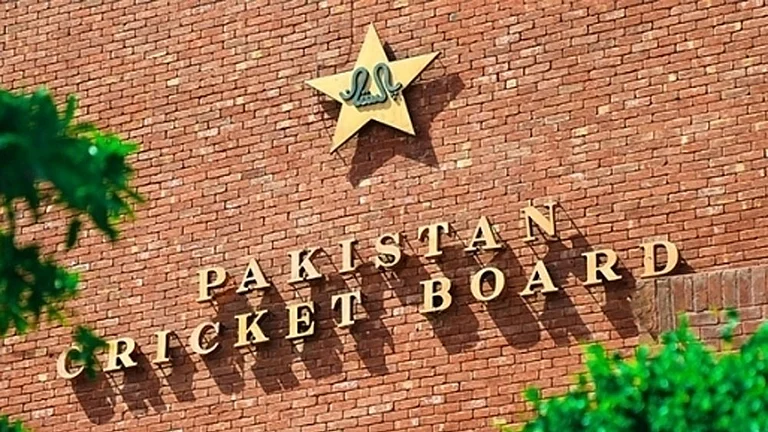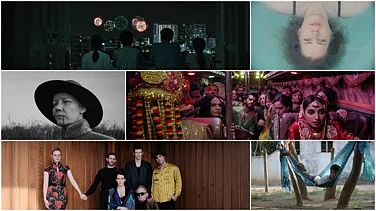
MGR, Jayalalitha in Raman Thediya Sita
The black-and-white era contributed some indelible moments of magic through song and music to add sheen to the lead pair's romance. In matters of the heart, it was Gemini Ganesan, better known off-screen for his unapologetic attitude to love and incurable thirst for romance, who led the way. In a cinema culture that thrived on hyperbole and sobriquets, Ganesan was called 'Kadhal Mannan' or king of romance in Tamil filmdom. In the 1950s and '60s, it was the triumvirate of Gemini Ganesan, Sivaji Ganesan and M.G. Ramachandran that set the acting trends in Tamil cinema. Sivaji eschewed the art of street theatre and brought gravitas to his passion and MGR, a non-actor otherwise, was the superstar who revelled in romantic caprices to tame his heroines. Sivaji's onscreen chemistry with Padmini in Thillana Mohanambal, a tale about classical performing artistes, remains unforgettable for its scenes of passionate love between a combative and creative couple. MGR's seaside romances with Saroja Devi in Padagotti and the budding charm of J. Jayalalitha's debut with MGR in Adimai Pennu are made for repeat watch on lazy, nostalgic afternoons.
Gemini Ganesan left machismo to the two bigger stars. His controlled gestures and genteel mannerisms remain his enduring contribution to romance in Tamil cinema. He wrung your heart with his quiet grief in Sumai Thangi, he was the endearing lover in Missiamma, a whimsical flirt in Thennilavu, a passionate paramour in Kappal Otiya Tamizhan, and a man wracked by his own infidelity in Iru Kodugal.
Tamil romance's sexual spark was lit by Kamalahaasan. He never played coy, and brought heat into romance. He kissed without much ado and canoodled with rising ardour. Ever the tease, he played the soulful romantic with touching finesse in Rajaparvai, a melodramatic loser with dignity in Salangai Oli and a mystical crazed lover later in Guna. Bollywood woke up to his charms in Ek Duje ke Liye (1981). Tamil audiences have never mourned a hero's entry into middle age more than that of Kamal's. His kind of lover boy is a hard act to follow in these days of mediocre performers who fail to convey the frisson and crackle of passionate love on screen.

| Nu age romance? Rajni, Shreya in Sivaji |
Rajnikanth's unorthodox style, his machismo and swagger, not to mention his demi-god status, made his romances seem more like conquests than love. He's played a sober lover at times, but his loyalists have always preferred him in the avatar of a superhero who conquers all, and whose prowess lies unchallenged by his consort in matters of the heart. Even dominatrix-like female characters failed to cut him down to size in films like Thambikku Endha Ooru, Mannan or Padaiyappa.
There have been women-centred romances in Tamil cinema, largely the work of filmmakers like Balachander, Mahendran, Balu Mahendra who showcased strong female leads - older women, mistresses, lovers and wives - but these films did not necessarily taste box-office success. The romance between a divorcee and a widower played by Jothika and Kamal respectively, and the story of a gay couple who become murderous villains, received damp responses. Bharathiraja gave rustic romances their rightful place in Tamil cinema. His lasting contribution remains the unusual tale of love between a middle-aged patriarch played by Sivaji Ganesan and a nubile peasant Radha in Mudhal Mariyadhai (1985), an unorthodox pairing for audiences fed on a diet of youthful gratification. Mani Ratnam's heroines too have played a larger part in romance - they can be playful, dignified but individualistic. But they remain a small voice in Tamil cinema.
Tamil cinema did go through a phase in the 1990s when swashbuckling heroes gave way to silent whiners, soulful lovers and shy worshippers, incapable of socially challenging parental authority to fulfil their romances. Actors like Murali, Vikram, Vijay and Dhanush went on to play such parts in monster hits and wrung women's hearts. But as their star status rose, moodiness was replaced by swagger. The Ghajinis are back. Surya romances the lasses and flattens villains with verve; Vijay's grungy appeal has pretty Punjabi heroines swooning on Swiss mountains, Vikram flexes his muscles as virginal heroines simper and Madhavan has girls going weak-kneed about his dimples. You can't keep the macho hero down for very long in Tamil cinema.


























